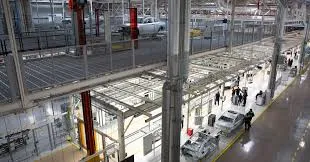Toluca, Mexico – The latest US auto tariffs have sent ripples through Mexico’s automobile industry, prompting concerns about job stability as Stellantis temporarily halts production at its assembly plants. Workers at the Toluca facility, which manufactures brands like Jeep and Ram, are uncertain about their future as the company evaluates the economic impact of the tariffs.
Stellantis Pauses Production Amid Tariff Uncertainty
On Thursday, Stellantis announced a month-long production stoppage at its Toluca plant in Mexico, as well as another facility in Canada. As a result, 900 workers in Michigan and Indiana are facing temporary layoffs. However, Stellantis officials confirmed that no job cuts are planned for Mexico, with employees focusing on training and maintenance during the pause.
The move follows US President Donald Trump’s decision to impose 25% tariffs on auto imports. While Mexico has a free trade agreement with the US and Canada under the United States-Mexico-Canada Agreement (USMCA), the Mexican government remains hopeful that its auto production will be largely exempt.
Mexican Government Downplays Concerns
President Claudia Sheinbaum addressed the situation on Friday, assuring workers that Stellantis is not planning layoffs. “It’s a temporary stoppage to evaluate current conditions,” she said. Sheinbaum further noted that one of Stellantis’ electric vehicles had already been struggling with sales, and the company is now reassessing whether to continue manufacturing the model.
Despite concerns, there are signs of resilience in Mexico’s auto industry. Swedish automaker Volvo announced plans to ramp up production at its Nuevo León plant, providing a counterbalance to Stellantis’ pause.
Workers React with Uncertainty and Hope
For many factory workers in Toluca, the announcement came as an unsettling surprise.
“I heard about the stoppage on the news,” said 31-year-old José Emilio, who worries that prolonged tariffs could lead to job losses in Mexico.
However, longtime employee Eduardo Jiménez, who has worked at the plant for 35 years, remains optimistic. “We’ve gone through a lot of crises before,” he said, expressing confidence in the industry’s ability to adapt.
Mexico’s Auto Industry at a Crossroads
The auto sector is vital to Mexico’s economy, employing nearly one million people and accounting for around 5% of the country’s GDP. With 87% of Mexico’s nearly 4 million exported vehicles heading to the US last year, the industry’s dependence on American buyers is undeniable.
Mexico is expected to push for the US to uphold the free trade terms outlined in the USMCA, which Trump himself signed during his first presidency.
Meanwhile, workers like Sergio Rodríguez, a 40-year-old Stellantis employee, remain hopeful that diplomatic negotiations will ease the pressure. “They’ll talk and reach an agreement,” he said, reflecting the cautious optimism shared by many in Mexico’s auto sector.
With production paused and negotiations looming, the coming weeks will be crucial in determining how deeply US tariffs will affect Mexico’s auto industry





















